Illinois Congressional delegation: How they voted
Chronicle Media — February 12, 2018Report for week ending February 9, 2018.
UNITED STATES HOUSE OF REPRESENTATIVES
Sexual Harassment In U.S. House: The House on Feb. 6 passed a bipartisan bill (HR 4924) that would reform the way it handles employees’ sexual-harassment allegations against lawmakers. The bill prohibits House members from engaging in a sexual relationship with any staff member they supervise; requires lawmakers to personally pay settlements arising from their misconduct; establishes an employee-advocacy office that provides legal counsel and general support to complainants; allows victims to talk publicly about settlements and requires public disclosure of members’ settlement payments.
Jackie Speier, D-Calif., said: “For years, members of Congress have gotten away with truly egregious behavior by mistreating their staff.” But “the American public has made it clear that they have had enough. They expect Congress to lead; and, for once, we are” doing so.
Barbara Comstock, R-Va., said “sexual harassment is about power — a misuse of power that impacts careers, lives and self-esteem.” This bill “is fundamentally changing that balance of power by creating an office for the victims, the Office of Employee Advocacy. This is the single most important thing in this legislation.”
No member spoke against the bill.
The bill was passed on a non-record voice vote and is now before the Senate.
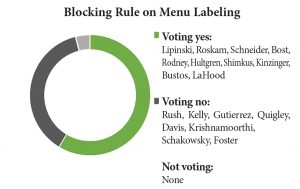 Blocking Rule on Menu Labeling: Voting 266 for and 157 against, the House on Feb. 6 passed a bill (HR 772) that would effectively block a Food and Drug Administration rule on menu labeling set to take effect in May after nearly eight years of drafting. Under the rule, chains of 20 or more locations bearing the same name must prominently display “accurate, clear and consistent” nutrition information — including calorie counts — for standard menu items at the point of sale. If this bill were enacted, the FDA would have to restart its rulemaking process. In part, the bill would allow restaurants to use non-comparable (usually smaller) serving sizes in displaying calories and exempt from the rule most pizza-delivery chains as well as companies that receive less than half their revenue from retail food sales.
Blocking Rule on Menu Labeling: Voting 266 for and 157 against, the House on Feb. 6 passed a bill (HR 772) that would effectively block a Food and Drug Administration rule on menu labeling set to take effect in May after nearly eight years of drafting. Under the rule, chains of 20 or more locations bearing the same name must prominently display “accurate, clear and consistent” nutrition information — including calorie counts — for standard menu items at the point of sale. If this bill were enacted, the FDA would have to restart its rulemaking process. In part, the bill would allow restaurants to use non-comparable (usually smaller) serving sizes in displaying calories and exempt from the rule most pizza-delivery chains as well as companies that receive less than half their revenue from retail food sales.
Fred Upton, R-Mich., said the retail-food industry employs “millions of Americans and provides access to affordable, healthy options. The federal government shouldn’t impose arbitrary regulations that are going to cause unnecessary harm to businesses and consumers.”
Jan Schakowsky, D-Ill., said: “At a time when our country is facing an obesity epidemic…we should not be undermining efforts to educate consumers about the nutritional value of foods, including calories.”
A yes vote was to send the bill to the Senate.
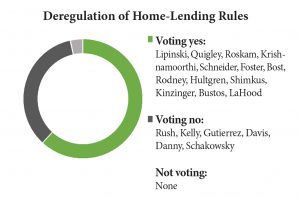 Deregulation of Home-Lending Rules: The House on Feb. 8 voted, 280 for and 131 against, to relax a Consumer Financial Protection Bureau rule designed to curb predatory home-lending practices such as those linked to millions of foreclosures in the 2008-2009 financial meltdown. The rule sets standards for “qualified mortgages,” or QM, in which the borrower is judged a good credit risk, the lender is protected against certain lawsuits and points and fees are capped at 3 percent of the loan amount. This bill (HR 1153) would exempt from the cap upfront escrow charges and the cost of title insurance provided by firms affiliated with the lender. Backers said this would help community banks expand homeownership opportunities, while critics said it would inject unnecessary risk into many loans while allowing title companies to charge excessive fees.
Deregulation of Home-Lending Rules: The House on Feb. 8 voted, 280 for and 131 against, to relax a Consumer Financial Protection Bureau rule designed to curb predatory home-lending practices such as those linked to millions of foreclosures in the 2008-2009 financial meltdown. The rule sets standards for “qualified mortgages,” or QM, in which the borrower is judged a good credit risk, the lender is protected against certain lawsuits and points and fees are capped at 3 percent of the loan amount. This bill (HR 1153) would exempt from the cap upfront escrow charges and the cost of title insurance provided by firms affiliated with the lender. Backers said this would help community banks expand homeownership opportunities, while critics said it would inject unnecessary risk into many loans while allowing title companies to charge excessive fees.
Bill Huizenga, R-Mich., said the bill “is narrowly focused to promote access to affordable mortgage credit without overturning the important consumer protections and sound underwriting required under (the Dodd-Frank law’s) ability-to-repay provisions.”
Maxine Waters, D-Calif., said: “Unfortunately, this bill is yet another attempt to undermine the strong consumer protections Democrats established under Dodd-Frank, taking us back to the days of the subprime bubble.”
A yes vote was to send the bill to the Senate.
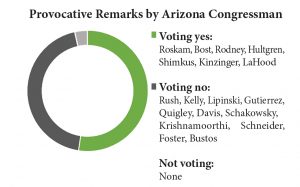 Provocative Remarks by Arizona Congressman: Voting 231 for and 187 against, the House on Feb. 6 blocked a Democratic attempt to force consideration of a resolution formally condemning Rep. Paul Gosar, R-Ariz., for having asked the U.S. Capitol police to arrest undocumented immigrants in attendance at President Trump’s State of the Union address. Several undocumented aliens known as “dreamers” were there as guests of Democratic members. Gosar said in one tweet: ”Any illegal aliens attempting to go through security, under any pretext of invitation or otherwise, should be arrested and deported….” As a privileged resolution (H Res 726), the measure was not debatable.
Provocative Remarks by Arizona Congressman: Voting 231 for and 187 against, the House on Feb. 6 blocked a Democratic attempt to force consideration of a resolution formally condemning Rep. Paul Gosar, R-Ariz., for having asked the U.S. Capitol police to arrest undocumented immigrants in attendance at President Trump’s State of the Union address. Several undocumented aliens known as “dreamers” were there as guests of Democratic members. Gosar said in one tweet: ”Any illegal aliens attempting to go through security, under any pretext of invitation or otherwise, should be arrested and deported….” As a privileged resolution (H Res 726), the measure was not debatable.
A yes vote was in opposition to condemning Gosar for his comments.
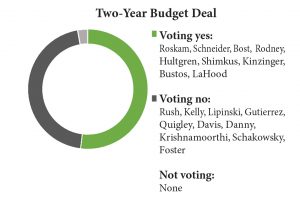 Two-Year Budget Deal: Voting 240 for and 186 against, the House on Feb. 9 passed a federal budget (HR 1892) that would increase discretionary spending by at least $300 billion over present levels over two years and raise the national debt ceiling through February 2019. The bill would provide $6 billion for fighting opioid addiction and $20 billion for infrastructure projects over two years while funding $90 billion in disaster aid for California, Texas, Florida, Puerto Rico and the U.S. Virgin Islands. The bill is projected to push the 2018 deficit above $1 trillion and increase annual deficits by at least $320 billion over 10 years, or $418 billion counting new borrowing costs the bill would trigger.
Two-Year Budget Deal: Voting 240 for and 186 against, the House on Feb. 9 passed a federal budget (HR 1892) that would increase discretionary spending by at least $300 billion over present levels over two years and raise the national debt ceiling through February 2019. The bill would provide $6 billion for fighting opioid addiction and $20 billion for infrastructure projects over two years while funding $90 billion in disaster aid for California, Texas, Florida, Puerto Rico and the U.S. Virgin Islands. The bill is projected to push the 2018 deficit above $1 trillion and increase annual deficits by at least $320 billion over 10 years, or $418 billion counting new borrowing costs the bill would trigger.
A yes vote was to send the bill to President Trump.
UNITED STATES SENATE
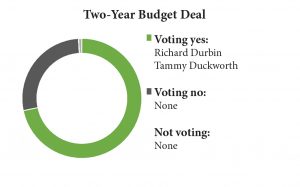 Two-Year Budget Deal: Voting 71 for and 28 against, the Senate on Feb. 9 passed a bill (HR 1892, above) that would boost discretionary spending by at least $300 billion through the fiscal year ending Sept. 30, 2019, while increasing deficits by a projected $320 billion over 10 years, or $418 billion counting new borrowing costs the bill would trigger. Military programs would receive nearly 60 percent of the spending increase with the remainder going mostly to domestic programs in areas such as education, health care, transportation, social services and job training.
Two-Year Budget Deal: Voting 71 for and 28 against, the Senate on Feb. 9 passed a bill (HR 1892, above) that would boost discretionary spending by at least $300 billion through the fiscal year ending Sept. 30, 2019, while increasing deficits by a projected $320 billion over 10 years, or $418 billion counting new borrowing costs the bill would trigger. Military programs would receive nearly 60 percent of the spending increase with the remainder going mostly to domestic programs in areas such as education, health care, transportation, social services and job training.
The bill repeals the Independent Payment Advisory Board, a panel of 15 outside health experts created by the Affordable Care Act to help control Medicare costs; renews energy tax breaks in areas ranging from the biofuels to nuclear power; extends a host of other business tax credits and deductions; authorizes the sale of 100 million barrels of oil from the Strategic Petroleum Reserve and raises customs and airport-security fees over 10 years
A yes vote was to send the bill to the House.







